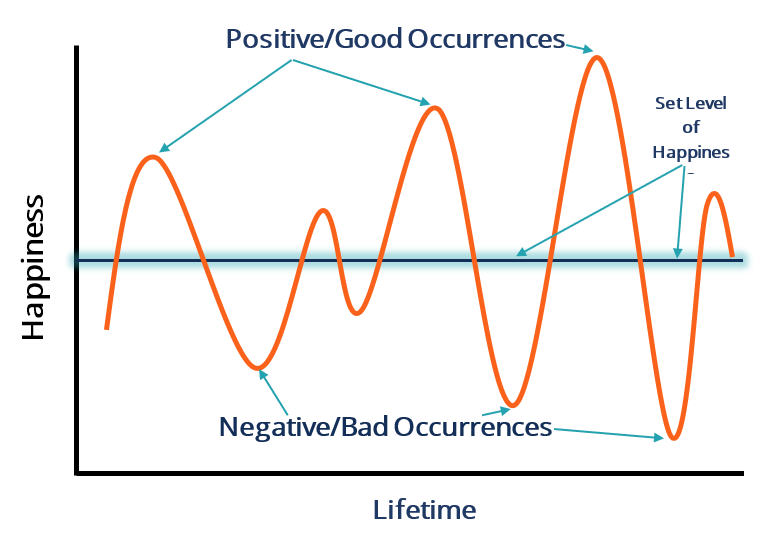Ever wondered what it would be like to win the lottery? Spent hours pondering what you would buy first, how much you would give away and who was on the list to receive it?
Undoubtedly we all assume to a certain degree that winning the lottery would solve all our issues one way or another. If we just had an obscene amount of cash, we’d be just fine until the rest of our days.
Well, perhaps not.
Research actually shows in many cases, there is little to no improvement in a person's happiness post lottery win.
“We find that winning large sums of money strongly affects how content you are with your personal finances. But it does not affect how you feel about other aspects of life, such as your health, or your relationships with friends and family,” said Erik Lindqvist
So how could this be?
Introducing the Hedonic Treadmill
Did you know you’ve been running all your life and an imaginary treadmill? No wonder you’re often tired and hungry ay!
What is the hedonic treadmill?
The hedonic treadmill or hedonic adaptation theory refers to the psychological phenomenon where people tend to quickly return to a relatively stable level of happiness or satisfaction after experiencing positive or negative events, such as acquiring new possessions, achieving goals, or facing setbacks. In other words, despite changes in external circumstances, individuals revert back to their baseline level of well-being over time.
“Until we have begun to go without them, we fail to realise how unnecessary many things are. We’ve been using them not because we needed them but because we had them.” - Seneca
Why should you care about the hedonic treadmill?
The treadmill metaphorically represents a long-term struggle without much progress, just like those heroes working in lifts you have your ups and your downs and after all, you are stuck in the same happiness position overall.
You should care because the hedonic treadmill teaches us an important lesson. That we shouldn’t be chasing the temporary dopamine hit we get from achieving a goal, buying a new fancy thing or watching the numbers on our bank balance go up. We should instead think about how we can increase our baseline level of happiness so when we have the inevitable spikes in life, we return to a baseline level of happiness that is much higher than if we hadn’t worked on ourselves.
This is aequanimitas latin for equanimity. Aequanimitas was the last word uttered by Antoninus Pius (cracking name) and probably one of my favourite words, it is simple in nature but difficult to master, so much so we are still talking about the pursuit of it centuries after Pius on his death bed.
What does equanimity mean?
The ability to maintain a calm and steady state of mind, characterised by a balanced and stable mindset.
By pursuing equanimity, instead of big happiness spikes, we can smooth out the curve meaning we stick closer to a stable baseline. One that is rational and proactive, that realises we have the option to choose how we think and feel about things.
It protects us from pouring our energy into the wrong places and actually being worse off when we realise that all of our efforts didn’t bring us the happiness we wanted.
If we set goals while hating the journey, we set ourselves up for failure. We must understand that the journey of evolution is to be enjoyed and the end goal is just a happy coincidence in doing what we loved. We can cultivate an understanding that the obstacles in life should not be avoided or feared, but rather embraced and used as opportunities for growth, learning, and self-improvement.
If we chase shiny things we will end up doing things we don’t like to own possessions that own us, we will end up in very expensive golden handcuffs trapped and addicted to material things that won’t make us nearly as happy as one single meaningful relationship could.
As King Midas found out, infinite wealth of the wrong kind can easily become a curse.

Credit: theprudentinvestor.in
If know we are prone to short temporary bouts of increased happiness before we return back to our baseline level of happiness, this knowledge should change our relationship with happiness and how we chase it. The aim should be not for short temporary increases but to improve your baseline level of happiness over time.
In Germany pioneering happiness researchers Fujita and Diener examined changes in baseline happiness and wellbeing over a 17-year large sample study of Germans!
What they found was very interesting. While there was significant stability in the happiness assessments (those stuck on the hedonic treadmill in the status quo) 24% of participants experienced a significant change to their happiness level showing that long-lasting improvements can be made outside the hedonic treadmill.
They found that there are a number of internal circumstances under your own voluntary control which while they all require real effort, these changes have the power to increase your happiness lastingly.
So now we have our sights on something powerful and long-lasting. Something that less than a quarter of people manage to achieve. We can take a break from the treadmill way of life.
We can start building a life that focuses on long-term happiness. Building strong fundamental pillars of happiness relationships, health, wealth and freedom.
“Wealth consists not in having great possessions, but in having few wants.”- Epictetus
